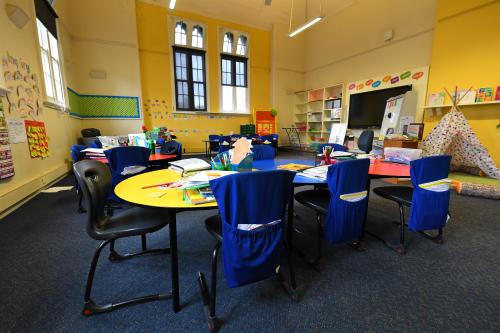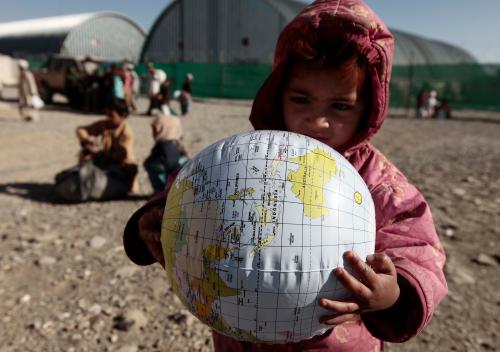The United Nations recently reported that 166 countries closed schools and universities to limit the spread of the coronavirus. One and a half billion children and young people are affected, representing 87 percent of the enrolled population.
With few exceptions, schools are now closed countrywide across Africa, Asia, and Latin America, putting additional stress on education systems in developing countries, many of which are struggling to provide quality education for all.
What considerations do disruption on this scale raise? Are there ways to mitigate the effects of protracted school closures?
The long game
Most education systems in low- and middle-income countries were grossly underfinanced even before the coronavirus crisis. The Education Commission, convened by Gordon Brown, had called for increases in domestic resources, foreign aid, and private and philanthropic efforts. The Commission’s “Learning Generation” report estimated that spending on education in low- and middle-income countries must more than double between 2015 and 2030, from approximately $1.25 trillion per year to nearly $3 trillion.
Countries that depend heavily on trade, tourism, or commodity exports may be at especially high risk right now, as raising domestic resources will be difficult. For example, the price of oil has fallen from $63 per barrel in early January to $20 per barrel today, a shock to budgets in countries with large proportions of young people ranging from Timor-Leste to Nigeria. Many other lower-income countries have acquired significant debt in recent years, making them especially vulnerable to economic shocks. According to the IMF, two-fifths of low-income countries are at risk of, or in, debt distress.
In poorer countries, education finance depends much more heavily on households than it does in wealthier countries. (Private expenditure accounts for 38 percent of spending on education in low- and middle-income countries versus 19 percent in high-income countries). Poor families make extraordinary efforts to support their children in school. If a coronavirus-induced recession leads to loss of jobs and income, consideration must be given to protecting poor families—shielding them from the potentially tragic dilemma of choosing between school or work, health care, and even food for children.
Winning the long game will require protecting—and even continuing to increase—education financing from domestic and international sources. The coronavirus will impact budgets, but it will not change this basic demographic fact: Education systems must continue to grow and improve in low- and middle-income countries, whose young people will profoundly shape the world.
Winning the long game will require great effort on the part of governments to protect and prioritize education spending within their budgets; international donors to prioritize financing for education; and creative thinking by all on expanding social support programs.
Technology
Many school systems are turning to technology as an alternative to in-school instruction. Classes have gone online, while many educators talk of “reimagining” education in ways that will shift it from a classroom- and teacher-centered model.
The move has exposed the glaring digital divide that exists even within the wealthiest countries. In California, home to Silicon Valley, only 56 percent of low-income households have broadband subscriptions. Internationally, with few exceptions, African countries rank in the bottom third of countries in terms of internet availability and affordability, making online instruction a distant prospect for most people. In these circumstances, relying on a strategy that moves education online risks exacerbating inequity.
What most countries do have, however, is a simpler radio and television infrastructure. Rather than rushing into potentially expensive new education technology investments, school systems might consider rapidly scaling up educational radio and television programming, which has ready potential to reach a great number of students and educators.
Teachers
Teachers are the head and heart of the educational enterprise. Many developing countries have worked hard to build a qualified and motivated teaching force. At the same time, many have suffered setbacks due to conflicts, natural disasters, or long-term governance problems. It is an unfortunate sign of the times that disaster response and recovery is becoming a core business of governments and the international community.
The coronavirus may present explicit risks to the teaching force. Government budgets will be stressed. Some teachers may move from their posts to their hometowns or seek other work if school closings are prolonged. For example, Sierra Leone and Liberia faced considerable logistical challenges in repositioning teachers after conflicts in the early 2000s and again after the Ebola crisis a decade later.
Governments can take steps now to maintain and protect the teaching force. First and foremost, they need to ensure teachers continue to be paid and are positioned for a rapid school reopening once clearance is given. Second, they can make health and safety upgrades to schools, improving sanitation facilities and guidance on issues like handwashing and health education. Finally, to make up for lost time, they can replace traditional long holidays with an extra school session. Governments might even experiment with more permanent changes to the traditional school calendar, balancing local community rhythms with a schedule of teaching and learning that optimizes students’ and teachers’ time together.
Conclusion
The coronavirus crisis is a deep and sudden shock, but it is unlikely to be the last. Governments should not lose sight of the long-game: ensuring that all children and young people in low- and middle-income countries are educated. To build a healthy, prosperous, and secure future, let’s ensure school systems are adequately financed, make smart use of technology, and protect teachers.
The Brookings Institution is committed to quality, independence, and impact.
We are supported by a diverse array of funders. In line with our values and policies, each Brookings publication represents the sole views of its author(s).








Commentary
Coronavirus and challenging times for education in developing countries
April 13, 2020